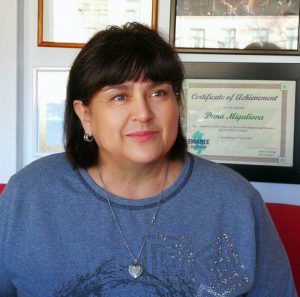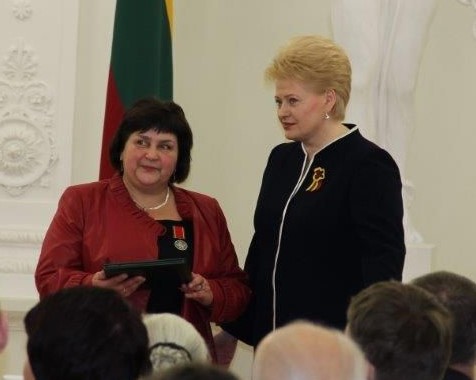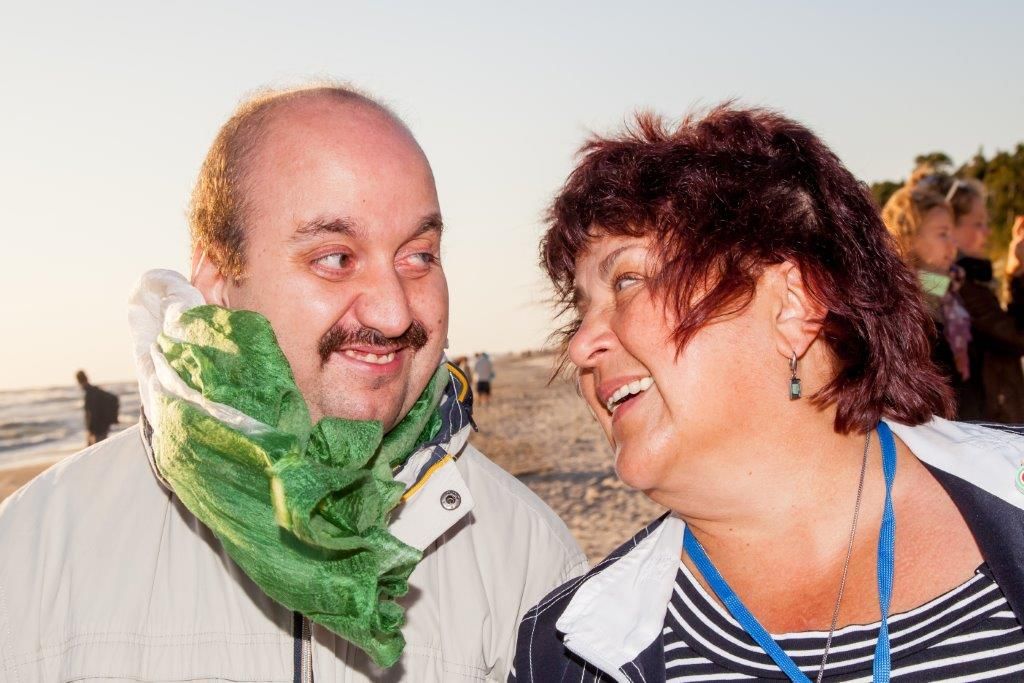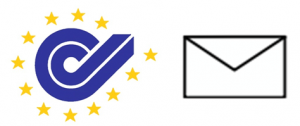Click here for the easy-to-read version
#30yearsofInclusion – Inclusion Europe turns 30 in 2018!
To mark this year, we will be highlighting and celebrating inclusion in Europe in its various forms and practices – and the people behind it.
Every month we will present one person who has brought the Inclusion movement forward in Europe.
Our Inclusion Heroine in March is Dana Migaliova.
Parents are important drivers of inclusion, and Dana Migaliova is certainly a perfect example for this. She has dedicated her life to improving the situation of people with intellectual disabilities and their parents in Lithuania and elsewhere, and is the president of our Lithuanian member Viltis as well as a former Inclusion Europe board member. Dana told us about her life as the mother of a son with an intellectual disability during the Soviet regime, how Viltis was founded, and how the situation for people with intellectual disabilities in Lithuania has changed in the years since.
You are the mother of a 38-year old son with complex support needs. When he was born, how was the situation for people with intellectual diasbilities and their families in Lithuania?
During the Soviet period, children with intellectual disabilities were brought up in institutions in harsh conditions. For example, if a disabled child fell ill, doctors did not prescribe proper medicine. It was an unwritten rule taken for granted. The children either overcame the illness by themselves – or they didn’t.
Parents raising children with disabilities were forced to look for a way to deal with the situation they were presented with. The widespread opinion was that all people should be healthy, and that disabled children are born only to “antisocial“ families. So most parents did not even leave the house for a walk with their disabled children.
As a family we decided that our son should live with us. But that meant that I had to work at night, without getting any rest as I had to take care of my son. I was very isolated from the rest of the world during this time.
How did you decide to become a founding member of Viltis? How did the founding members find each other?
In 1989 (independence had not yet been restored in Lithuania), a psychiatrist called Dainius Puras brought parents raising children with intellectual disabilities together, and asked them what they wanted for their children. The parents said they want them to live at home, to attend day centres, to receive proper care and treatment in case of illness, and to go to school.
They wanted to be able to work, to earn an income and be more financially stable. Dr. Puras replied that parents needed to build the structures to enable these changes themselves, that no one else would be able to do it better. A group was set up following this first meeting, initially consisting of nine parents. Dr. Puras was one of its initiators, and I was one of the members. In November 1989, we founded “Viltis“, the organisation of parents of persons with intellectual disabilities.
What was your biggest achievement with Viltis?
Actually, there are several things I am quite proud of! In 1991, the “Law on social integration of the disabled“ was adopted in Lithuania, in part thanks to our advocacy work, and based upon our input. The law established that people with disabilities have exactly the same rights as all other Lithuanian citizens. It gave all disabled children in Lithuania the right to study, abolishing the term “unsuited for schooling” once and for all.
Working in close cooperation with towns, cities and regions, we helped establish many day centres for children with intellectual disabilities, which provide them with the support and stimulation they need, while giving parents a chance to work.
We see how big institutions for persons with disabilities are being closed down in Lithuania these days, and I am glad that I am a member of the advisory group helping make this happen. Viltis is now very much involved in community-based services. The country has become much more progressive!
Why did you decide to become involved on the European level, as a board member of Inclusion Europe and working with many Baltic and Eastern European countries?
In the beginning, we had a lot to learn about running an organization like Viltis. Following the restoration of Lithuania’s independence in 1990, we received a lot of help from foreign partners. There was a big diaspora of Lithuanians living abroad, for example in the United States, Australia and Germany, and these people helped us in making new connections on the international level.
We were also supported by many of Inclusion Europe’s members, for example Lebenshilfe Germany, FUB in Sweden, the Danish LEV, and Mencap in the UK, as well as ENABLE Scotland, who in fact introduced us to Inclusion Europe. We became a member of Inclusion Europe in 1998, and I served as a board member from 2006 to 2009, and again from 2012 till 2015.
I wanted to learn about how other European countries approach social policy regarding people with intellectual disabilities. I also wanted to share my experience with organisations from Eastern European countries – and I can say that I not only learned a lot but also had the opportunity to give back!
We have had good contacts with our Baltic neighbours – Rupju Berns in Latvia and EVPIT in Estonia – for a long time, as we share the same background. We cooperate closely with organisations in Eastern Europe – for example in Belarus, Moldova, Tadzikistan, Georgia and Kazachstan. In a way, Lithuania is a bridge between the West and the East. We get asked for advice and are ready to help, just as we received support in the past. I am convinced that we can achieve a lot, and a lot quicker, if we collaborate.
How is the situation for parents of children with intellectual disabilities today? When you compare your situation 38 years ago with what happens now, what has changed?
A lot of changes have taken place since Viltis was established in 1989. Nowadays, people with intellectual disabilities visit public places – shops, libraries, cinemas, parks – and everyone is used to meeting them. Parents no longer have to hide their children with intellectual disabilities. People with intellectual disabilities are protected by law, they attend mainstream schools and can receive all kinds of training – advocacy training, peer support, education to acquire new skills, etc. Families raising children with disabilities receive a lot of support and tools to protect their child. People with intellectual disabilities and family members are now services users, they think and speak about quality of life, and thanks to the support available, they are sure that they will reach their goals!
What is your wish for the future?
My wish is for my son to always be safe. I wish he had a personal assistant so he could feel more independent. I wish for children with intellectual disabilities everywhere to be able to go to school and be integrated in society, and for their parents to have a decent life and enough time for a job. I wish for every person with a disability to get the support they need and to be treated as an individual.
Our Inclusion Heroine of February was Irish actress and musician Aimée Richardson. Read the interview with Aimée:
“More roles must be written for people with intellectual disabilities!”
Our Inclusion Heroine of January was self-advocate Elisabeta Moldovan from Romania. Read more:
“I experienced a lot of abuse in institutions. I wanted to change this situation for others.”
Find out more about inclusive education
Learn more about getting easy-to-understand information about healthcare
Find all our anniversary news on social media by following #30yearsofInclusion on Facebook and Twitter
Flavours of European inclusion: celebrating 30 years of learning, working and achieving together
At Inclusion International’s World Congress, Inclusion Europe will celebrate its 30th anniversary with a special event.
Inclusion Europe members will present not only their country’s food, culture and customs, but also their inclusion achievements during the last 30 years at tables spread across the room.
Participants are invited to discover stories, pictures and objects illustrating how the inclusion movement has moved forward during the last three decades, while tasting delicious national specialties and making new connections.
They will learn about successful practices of European collaboration for inclusion and about partnerships national members have formed with companies, government agencies and donors.
We will end the anniversary event in style: with a toast and a little surprise.
Afterwards, participants can join the World Congress party.
Register here for the World Congress
Would you like to receive more news like this? Subscribe!

Easy-to-read version
Click on a word which is in bold to read what it means.
“Parents do not hide their children anymore”
Inclusion Europe turns 30 years old in 2018.
We are celebrating this in a special way:
we are looking at what has been done in Europe
to make sure people are included.
Every month we will talk about one person
who has worked towards inclusion in Europe.
Our Inclusion Hero in March is Dana Migaliova.
Parents have an important role to play
in making sure all children are included.
For example, Dana Migaliova is the
mother of a son with an intellectual disability.
She has spent her life working to support
people with intellectual disabilities and their parents.
Dana Migaliova is the president of Viltis.
Viltis is an organisation for parents of people with intellectual disabilities.
It is a member of Inclusion Europe.
Dana Migaliova also used to be on the board of Inclusion Europe.
Dana Migaliova talked to us about how things have changed
for people with intellectual disabilities in Lithuania.
Question 1:
Your son was born with an intellectual disability 38 years ago.
What was it like for people with intellectual disabilities
at that time in Lithuania?
It used to be normal for children with intellectual disabilities
to be put in institutions.
They were treated badly.
For example, if they got sick
they were not given the proper care and medicine.
Society looked down on families of children with intellectual disabilities.
Many parents were afraid to take their children outside to play.
As a family, we all wanted our son to live with us.
To have a job and look after my son,
I had to work all night.
I was so busy that I did not get a chance to talk to other people.
Question 2:
How did Viltis start?
A doctor called some parents of
children with intellectual disabilities together.
The parents said they wanted their children to live at home,
get proper medical care and go to school.
The doctor said that the parents would be the best people
to start making these changes.
A few parents made a group.
This was the start of Viltis, in 1989.
Question 3:
What are your biggest achievements?
I worked to improve the law for people with intellectual disabilities.
I was proud when the law changed in 1991,
so that people with intellectual disabilities
have the same rights as everyone else in Lithuania.
The law gave all children the right to study.
I also help start day centres for children with intellectual disabilities,
to give parents the chance to go to work.
I am glad to be part of the group helping to close down institutions.
Viltis supports community-based services.
Question 4:
Why did you get involved with Inclusion Europe?
Enable Scotland introduced us to Inclusion Europe.
Enable Scotland is a member of Inclusion Europe.
We were also supported by other members of Inclusion Europe,
for example, members from Germany, Sweden and Denmark.
I wanted to learn about how other European countries
include people with intellectual disabilities.
I also wanted to share our experiences in Lithuania.
Question 5:
What is it like for families of children with intellectual disabilities
in Lithuania today?
People with intellectual disabilities are more accepted in the community.
Parents do not hide their children anymore.
There are more laws to protect people with intellectual disabilities.
Children with intellectual disabilities can go to normal schools.
There are services to support their families.
So it is much better than before.
Question 6:
What is your wish for the future?
I wish for my son to always be safe.
I wish he had a personal helper so he could feel more independent.
I wish for children with intellectual disabilities everywhere
to be able to go to school.
I wish for their parents to have enough time for a job.
I wish for every person with a disability to get the support they need
and to be treated as an individual.
Read about our other Inclusion Heroes,
Aimée Richardson and Elisabeta Moldovan.
Learn more about inclusive education.
Learn more about getting easy to understand healthcare information.
Find out about our birthday on social media by
clicking #30yearsofInclusion on Facebook and Twitter.
Celebrating 30 years of European inclusion
At the World Congress of Inclusion International,
Inclusion Europe will celebrate its 30th birthday with a special event.
Inclusion Europe’s members will talk about what they have done
for inclusion over the last 30 years.
They will also share their national foods and culture.
Participants will learn about how the members of Inclusion Europe
have worked together over the past 30 years.
Participants will also learn about how the members of Inclusion Europe
have worked with other companies, governments and donors.
We will end the event in a special way: with a drink and a little surprise.
Afterwards, participants can join the World Congress party.
Register here for the World Congress.
Use the hashtag #LearnInspireLead on Facebook and Twitter.[:]









